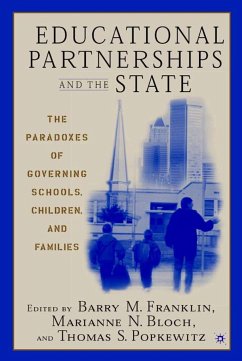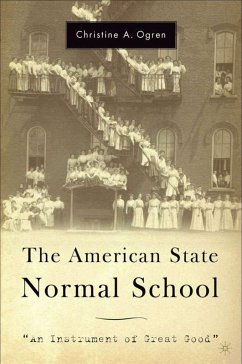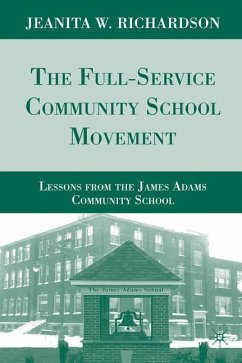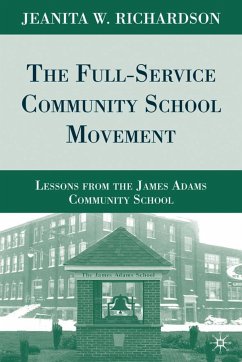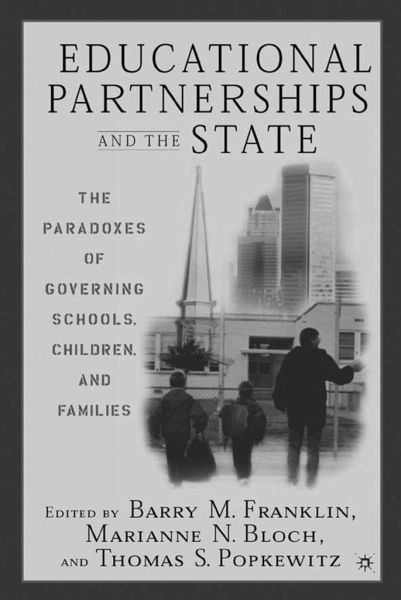
Broschiertes Buch
Educational Partnerships and the State: The Paradoxes of Governing Schools, Children, and Families
Versandkostenfrei!
Versandfertig in über 4 Wochen

PAYBACK Punkte
20 °P sammeln!





"Educational Partnerships and the State" is a compelling collection of essays by an international group of scholars that provides a critical exploration of the role of partnerships in contemporary educational reform. Their focus is on the expanding role that collaboration between the public and private sector has come to play in the governing of schools, children, and families in response to an array of worldwide economic and social changes. The contributors to this volume highlight the new relationship between civil society and the state through partnerships and what that linkage has come to mean for an array of educational issues including academic achievement, school governance, school parent-relationships, teacher education, the construction of family and community involvement, and the discourses of reform as practices that order participation and action.
EDGAR AMADOR Graduate Student in applied anthropology, University of South Florida, USA JENNIFER AVERY Graduate Student in applied anthropology, University of South Florida, USA M. YVETT BABER Independent Researcher in applied anthropology MARIANNE N. BLOCH Professor of Curriculum and Instruction, University of Wisconsin-Madison, USA KATHRYN M. BORMAN Professor of Anthropology and Assistant Director, David C. Anchin Center, University of South Florida, USA R. BUENFIL BURGOS Professor of Education, Cinvastev, Mexico MIRAM E. DAVID Professor of Policy Studies, Department of Education and Director, Graduate School of Science Sciences, Keele University, UK MARNY DICKSON Research Officer, Education Policy Research Unit, Institute of Education, University of London, UK LYNN FENDLER Assistant Professor of Education, Department of Teacher Education, Michigan State University, USA BARRY M. FRANKLIN Professor and Head of the Department of Secondary Education, Utah State University, USA SHARON GEWIRTZ Professor of Education, King's College London, UK DAVID HALPIN Professor of Education and Head of the School of Curriculum, Pedagogy and Assessment, Institute of Education, University of London, UK I-FANG LEE Doctoral Student in curriculum and instruction, University of Wisconsin-Madison, USA HENRY M. LEVIN William H. Kilpatrick Professor of Economics and Education, Teachers College, Columbia University, New York, USA GARY MCCULLOCH Brian Simon Professor of the History of Education, Institute of Education, University of London, UK RUTH L. PEACH Doctoral Student in Curriculum and Instruction, University of Wisconsin-Madison, USA THOMAS S. POPKEWITZ Professor of Curriculum and Instruction, University of Wisconsin-Madison, USA SALLY POWER Professor of Education and Head of the School of Educational Foundation and Policy Studies, Institute of Education, University of London, UK GEOFF WHITTY Director of the Institute of Education, University of London, USA
Produktdetails
- Verlag: Palgrave Macmillan / Palgrave Macmillan US / Springer Palgrave Macmillan
- Artikelnr. des Verlages: 978-1-4039-6129-7
- 2003
- Seitenzahl: 273
- Erscheinungstermin: 18. Dezember 2003
- Englisch
- Abmessung: 214mm x 154mm x 16mm
- Gewicht: 335g
- ISBN-13: 9781403961297
- ISBN-10: 1403961298
- Artikelnr.: 21821020
Herstellerkennzeichnung
Libri GmbH
Europaallee 1
36244 Bad Hersfeld
gpsr@libri.de
'Barry Franklin's Educational Partnerships and the State could not be more timely. The volume significantly increases our knowledge of the meaning, development, and operation of educational partnerships. Franklin and his colleagues powerfully connect educational partnerships to questions of citizenship development and education for a democratic society. Franklin, simply put, helps us to better understand what educational partnerships are and why genuine and effective partnerships are so crucial for the future of democracy. I enjoyed the book and learned a great deal from it.' - Ira Harkavy Associate Vice President and Director, Center for Community Partnerships,
University of Pennsylvania
'This book provides rich insight
University of Pennsylvania
'This book provides rich insight
Mehr anzeigen
into the nature of educational partnerships, which have emerged in recent years as part of a larger effort to reconcile fairness and markets by forging a 'third way' between left and right. In the name of inclusion and equity, these partnerships seek to bring about a devolution of responsibility for education from the state to the civil society and the individual. However, the studies in this book show that, as government abandons the effort to promote equality and as the discourse of democracy becomes the discourse of accountability, individuals find themselves with more responsibility for educational outcomes and less control over educational processes. The authors suggest that, in the end, educational partnerships may leave us with anoverburdened citizen and an irresponsible state.' - David Labaree, author of How to Succeed in School without Really Learning and Professor, School of Education, Stanford University, USA
'Educational Partnerships and the State presents a timely and significant commentary on the complex issues raised by recent attempts by reformers, in the USA and Britain, to use partnerships to link the civil society and the state and, in so doing, to find a 'third way' in policy between excessive reliance on either the state or on markets. The editors and contributors to this book caution that, beneath the appealing rhetoric of partnerships, a number of dangers and paradoxes lurk. Beneath the language of social inclusion, new patterns of exclusion may develop; beneath attempts to expand civil society, the regulatory power of the state may increase. Partnerships to bring the poor into decision-making may ultimately engineer greater parent and community support for institutional goals set by elites. In presenting critical analysis that reveals these kinds of dangers in 'third way' reforms, this volume contributes to a more sophisticated understanding of the policy dilemmas facing reformers and educators today. Policy-makers, scholars, activists, and educators should read this book.' - William L. Boyd, Batschelet Chair Professor of Educational Administration, Pennsylvania State University
'Educational Partnerships and the State presents a timely and significant commentary onthe complex issues raised by recent attempts by reformers, in the USA and Britain, to use partnerships to link the civil society and the state and, in so doing, to find a 'third way' in policy between excessive reliance on either the state or on markets. The editors and contributors to this book caution that, beneath the appealing rhetoric of partnerships, a number of dangers and paradoxes lurk. Beneath the language of social inclusion, new patterns of exclusion may develop; beneath attempts to expand civil society, the regulatory power of the state may increase. Partnerships to bring the poor into decision-making may ultimately engineer greater parent and community support for institutional goals set by elites. In presenting critical analysis that reveals these kinds of dangers in 'third way' reforms, this volume contributes to a more sophisticated understanding of the policy dilemmas facing reformers and educators today. Policy-makers, scholars, activists, and educators should read this book.' - William L. Boyd, Batschelet Chair Professor of Educational Administration, Pennsylvania State University
'Franklin, Bloch and Popkewitz's Educational Partnerships and the State could not be more timely. The volume significantly increases our knowledge of the meaning, development, and operation of educational partnerships. Franklin and his colleagues powerfully connect educational partnerships to questions of citizenship development and education for a democratic society.Franklin, Bloch, and Popkewitz, simply put, help us to better understand what educational partnerships are and why genuine and effective partnerships are so crucial for the future of democracy. I enjoyed the book and learned a great deal from it.' - Ira Harkavy, Associate Vice President, University of Pennsylvania
'Educational Partnerships and the State presents a timely and significant commentary on the complex issues raised by recent attempts by reformers, in the USA and Britain, to use partnerships to link the civil society and the state and, in so doing, to find a 'third way' in policy between excessive reliance on either the state or on markets. The editors and contributors to this book caution that, beneath the appealing rhetoric of partnerships, a number of dangers and paradoxes lurk. Beneath the language of social inclusion, new patterns of exclusion may develop; beneath attempts to expand civil society, the regulatory power of the state may increase. Partnerships to bring the poor into decision-making may ultimately engineer greater parent and community support for institutional goals set by elites. In presenting critical analysis that reveals these kinds of dangers in 'third way' reforms, this volume contributes to a more sophisticated understanding of the policy dilemmas facing reformers and educators today. Policy-makers, scholars, activists, and educators should read this book.' - William L. Boyd, Batschelet Chair Professor of Educational Administration, Pennsylvania State University
'Educational Partnerships and the State presents a timely and significant commentary onthe complex issues raised by recent attempts by reformers, in the USA and Britain, to use partnerships to link the civil society and the state and, in so doing, to find a 'third way' in policy between excessive reliance on either the state or on markets. The editors and contributors to this book caution that, beneath the appealing rhetoric of partnerships, a number of dangers and paradoxes lurk. Beneath the language of social inclusion, new patterns of exclusion may develop; beneath attempts to expand civil society, the regulatory power of the state may increase. Partnerships to bring the poor into decision-making may ultimately engineer greater parent and community support for institutional goals set by elites. In presenting critical analysis that reveals these kinds of dangers in 'third way' reforms, this volume contributes to a more sophisticated understanding of the policy dilemmas facing reformers and educators today. Policy-makers, scholars, activists, and educators should read this book.' - William L. Boyd, Batschelet Chair Professor of Educational Administration, Pennsylvania State University
'Franklin, Bloch and Popkewitz's Educational Partnerships and the State could not be more timely. The volume significantly increases our knowledge of the meaning, development, and operation of educational partnerships. Franklin and his colleagues powerfully connect educational partnerships to questions of citizenship development and education for a democratic society.Franklin, Bloch, and Popkewitz, simply put, help us to better understand what educational partnerships are and why genuine and effective partnerships are so crucial for the future of democracy. I enjoyed the book and learned a great deal from it.' - Ira Harkavy, Associate Vice President, University of Pennsylvania
Schließen
Für dieses Produkt wurde noch keine Bewertung abgegeben. Wir würden uns sehr freuen, wenn du die erste Bewertung schreibst!
Eine Bewertung schreiben
Eine Bewertung schreiben
Andere Kunden interessierten sich für




